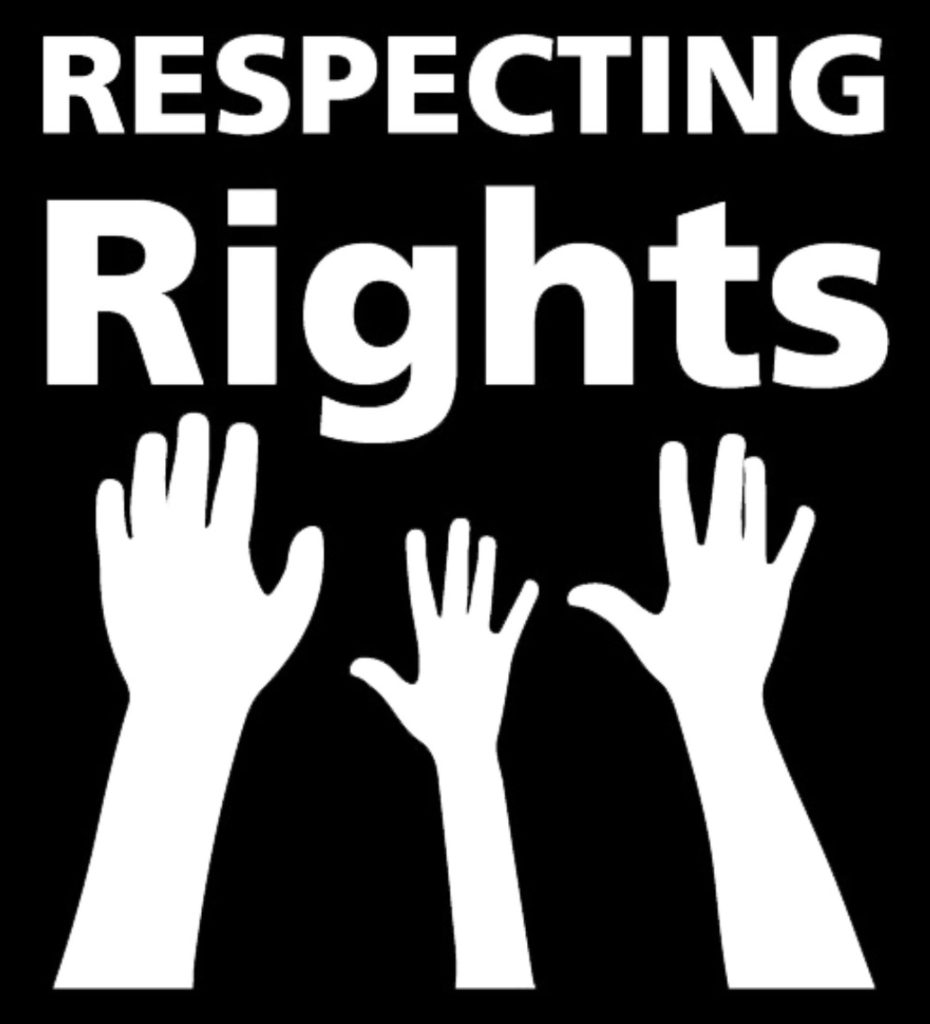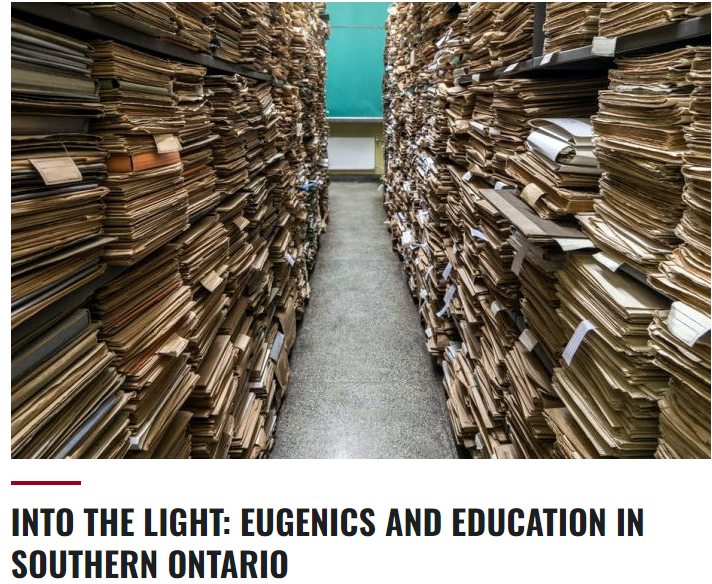
Respecting Rights
Respecting Rights is a project at ARCH that is led by self-advocates labelled with intellectual disabilities. Since 2011, Respecting Rights has provided innovative, accessible rights education to persons labelled with intellectual disabilities and their support networks across Ontario. Respecting Rights also works on accessible law reform projects. Our work builds the capacity of persons labelled with intellectual disabilities and their support networks through education and support for self-advocacy.
Visit the Respecting Rights Homepage to learn more about Respecting Rights including past and current projects, self-advocate meetings, resources and videos

Into the Light
Eugenics and Education in Southern Ontario – The documentary – For learning and teaching
The documentary Into the Light: Eugenics and Education in Southern Ontario, reveals over thirty years of eugenics education, including courses taught at the post-secondary level in central Canada, and highlights the efforts and stories of members of affected communities and the people who continue to work to foster social justice, including responding to Canada’s Truth and Reconciliation Commission.
Into the Light extends to studies in disability, decolonizing, social and political dimensions of bodies, difference, sexuality, archives, museum studies, history of sociology, psychology and anthropology, history of public health, education, and domestic science, Canadian history and the history of science, race and racism, equity, human rights law and policy, and more.
For more details about the documentary and how to access it please visit: Into the Light: Eugenics and Education in Southern Ontario

CRPD Optional Protocol Lab
The OP Lab offers a series of courses about the Optional Protocol (OP) and the Convention on the Rights of Persons with Disabilities (CRPD). Courses will include presentations from guest speakers, discussions and learning exercises
Participants in the OP Lab will join a Canada-wide network to advocate for the implementation of CRPD rights, and come up with innovative solutions on how to use the Optional Protocol in a strategic way.
The Optional Protocol (acceded to by Canada in 2018) is considered an additional part of the CRPD that allows people to make a complaint to the United Nations Committee on the Rights of Persons with Disabilities, in some circumstances when they believe their rights under the CRPD have been violated.
Please visit the CRPD Optional Protocol Lab webpage for more information including live recorded video sessions
ARCH has also published several materials such as papers, submissions, videos and factsheets on the United Nations oversight on the Convention on the Rights of Persons with Disabilities (CRPD) . To access these resources please visit our learn about the CRPD webpage.
ARCH has also written several publications on the UN CRPD in our ARCH Alert Newsletter. To access these publications, please visit our UN CRPD Updates webpage.

Medical Assistance in Dying
When Medical Assistance in Dying (MAiD) was legalized throughout Canada, it was limited to situations when a person’s natural death was reasonably foreseeable. In March 2021, legislative amendments expanded eligibility for MAiD. MAiD is no longer only for people who are near the end of life. People with disabilities, illnesses or diseases who are suffering and who meet the other criteria in the law can be found eligible and receive euthanasia. In March 2023, eligibility will again be expanded so that people who are suffering from “mental illnesses” can be euthanized. People with disabilities have died by MAiD because they are living in poverty, could not get healthy housing, specialized medical care or disability services they needed to live with dignity in the community. Canada’s MAiD law continues to cause deep distress for many disability communities in Ontario and across the country.
A special committee of Parliament is currently reviewing Canada’s MAiD law and its application with respect to mature minors, advance requests, mental illness, the state of palliative care in Canada and the protection of Canadians with disabilities. ARCH provided written submissions to this committee, highlighting the discriminatory impact of the law on persons with disabilities.
For more information including submissions, interviews and other written materials that ARCH has done in this area, please visit our Medical Assistance in Dying Webpage

Empowering Community and Removal of Barriers (ECRoB)
ARCH partnered with the organization L’Association pour la santé environnementale du Québec / Environmental Health Association of Québec on a project called “Empowering Community and Removal of Barriers (ECRoB)”. This two-year project has three goals:
1. To raise awareness, across Canada, about the legal rights of people with multiple chemical sensitivity (MCS) and other disabilities so that they can access accommodation
2. To create a group of educators who can deliver workshops across Canada to teach and inform other organizations about the disability, accessibility, and appropriate accommodations required for accessibility
3. To strengthen the connections between legal, medical, environmental, and disability groups to address accessibility in all these sectors and remove barriers (such as fragranced/perfumed or toxic products) that currently prevent access to the people experiencing the disability of Multiple Chemical Sensitivities.
The Environmental Health Association of Québec has several resources and videos available:
Resources
English: https://aseq-ehaq.ca/pdf/Resources_MCS.pdf
French: https://aseq-ehaq.ca/pdf/Ressources_SCM.pdf
Videos
English: https://www.youtube.com/watch?v=ZZ4D0sgHJdQ
French: https://www.youtube.com/watch?v=SdQ8NtE4-ZM
To learn more about this project please visit: HASEQ- EHAQ website on Empowering Community and Removal of Barriers

Inclusive Education Advocacy
ARCH, with our partners, released a series of comprehensive advocacy tools and modules on human rights and education. It is aimed at parents, advocates, and students with disabilities in primary and secondary school.
To access the video modules from advocacy for Inclusion please visit: Advocacy of Inclusion Video Series
ARCH Executive Director Robert Lattanzio joined a panel from Inclusive Education Canada (IEC) for a webinar series discussing education for students with disabilities in Ontario. Robert was also featured on an episode of “Let’s Chat…About Inclusive Education” where he discusses supporting families, the inconsistencies in education policy, and the groundswell needed for change.
To access watch the Inclusive Education Canada (IEC) Webinar please visit: IEC Webinar Series – Will Ontario schools ever be inclusive?
To access Episode 12 of “Lets Chat.. About Inclusive Education” please visit: Let’s Chat About Inclusive Education – Episode 12 ft. Roberto Lattanzio

Innovating for inclusive and equitable post-secondary education
Information coming soon

Civil Society Parallel Report on the Committee on the Rights of Persons with Disabilities (CRPD)
The Canadian Civil Society Parallel Report Group is an ad hoc group comprised of sixteen Disabled Peoples Organizations (DPOs) and supporters, representing a cross-section of Canadians with disabilities. In December of 2015, Canadian DPOs met in Ottawa to review preliminary comments on Canada’s Report, and to consider mechanisms for the preparation of submissions to the CRPD Committee as it prepared the List of Issues (LOI) and a subsequent parallel report. This report seeks to provide responses to selected priority areas identified by the committee in its September 2016 “List of Issues. For Canada.”
To learn more about this initiative and to read the submission please visit: ARCH Disability Law Centre | Submission – Canadian Civil Society Parallel Report Group Submission to UN Committee on the Rights of Persons with Disabilities

COVID-19
During the COVID-19 pandemic, ARCH Disability Law Centre wrote several publications and launched various campaigns to advocate for, and bring awareness to how the pandemic affected persons with disabilities. ARCH focused on several areas including: Education, Healthcare, Developmental Services, and Vaccination Distribution. For more information on ARCH’s work on issues relating to Covid-19 visit the COVID-19 Information webpage